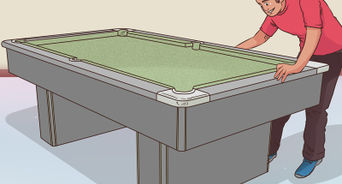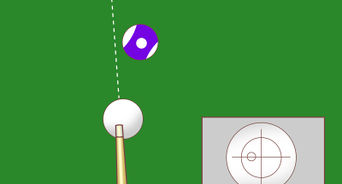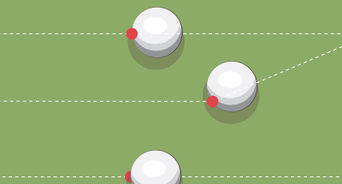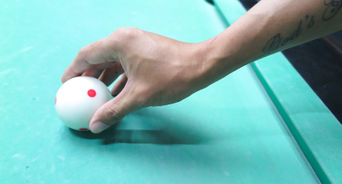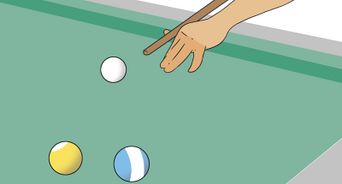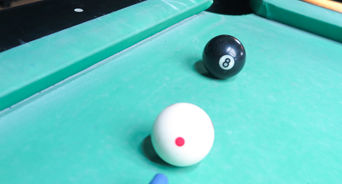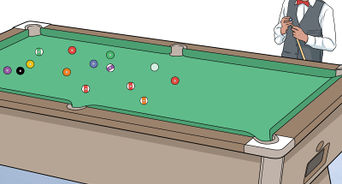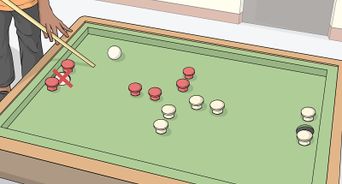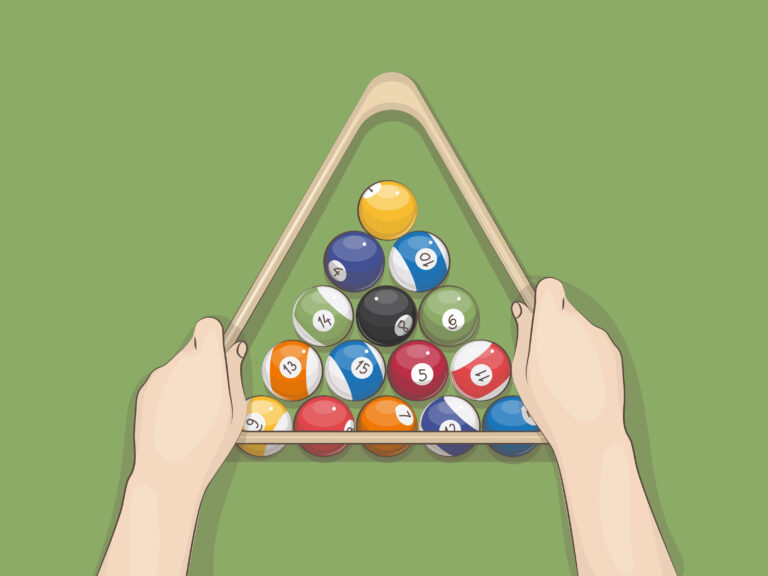
[ad_1]
Steps
Part 1
Part 1 of 2:
Positioning the Rack
-
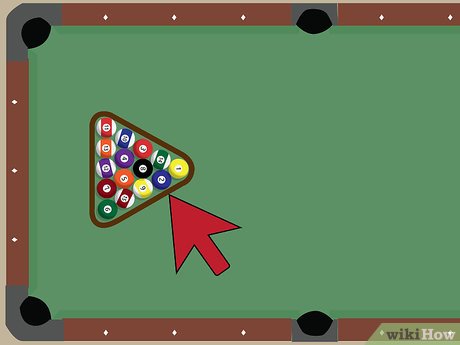
1Let the player who will break first rack the balls. In a recreational game, toss a coin or do a “lag” test to determine who will break and rack. To do the lag, position 1 ball on either side of the table, and have each person shoot to the other end cushion. The person whose ball hits the cushion and bounces back closest to the spot where they shot their ball will pick who breaks.- In a professional game, the player with the lowest official standing in the league always breaks first.
- If possible, you can have a player who isn’t playing rack the balls and act as a referee for the game.
-
 2Locate the black and white dot at the end of the pool table. Most pocket billiard tables are marked with a “foot spot” in the center of one end of the table, about halfway between the corner and side pockets. The foot spot is the spot furthest from the end of the table where the players stand during the break shot.[1]
2Locate the black and white dot at the end of the pool table. Most pocket billiard tables are marked with a “foot spot” in the center of one end of the table, about halfway between the corner and side pockets. The foot spot is the spot furthest from the end of the table where the players stand during the break shot.[1]
- If the table doesn’t have a marked foot spot, use the markings around the edge of the table to determine where it would be. The spot should rest on the centerline of the table when you’re standing at a short end. The spot will align with the 2nd mark on the edge of the table between the corner and side pockets.
-
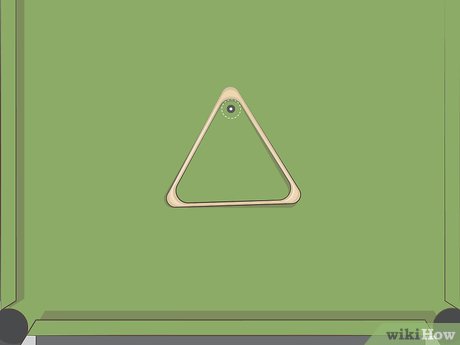 3Place the triangle rack with the top point over the foot spot. The rack is an equilateral triangle, so it doesn’t matter which point you put over top of the foot spot. Make sure you can see the black and white dot touching the top of the interior of the triangle. This spot is called the “apex” of the rack.[2]
3Place the triangle rack with the top point over the foot spot. The rack is an equilateral triangle, so it doesn’t matter which point you put over top of the foot spot. Make sure you can see the black and white dot touching the top of the interior of the triangle. This spot is called the “apex” of the rack.[2]
- Ensure the center of the ball that is placed in the apex of the rack will be exactly in the middle of the dot.
- There are other rack shapes, like the diamond, but those aren’t used for 8 ball pool.
-
 4Position the rack so that the base is parallel to the short end of the table. Once you have the apex positioned on top of the foot spot, make sure the bottom of the triangle is straight. The corners of the rack should be equal distances from the corner pockets on their side of the table.
4Position the rack so that the base is parallel to the short end of the table. Once you have the apex positioned on top of the foot spot, make sure the bottom of the triangle is straight. The corners of the rack should be equal distances from the corner pockets on their side of the table.- If the base is crooked, this can cause one of the sides of the rack to have a greater chance of going into a pocket.
Part 2
Part 2 of 2:
Organizing the Balls
-
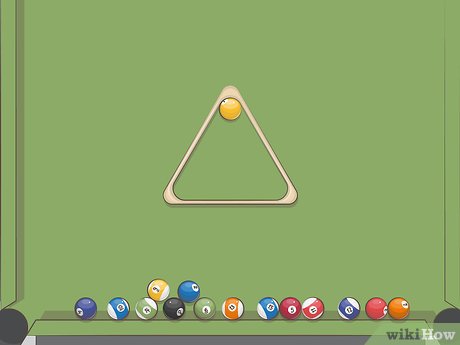 1Place any ball other than the 8-ball inside the triangle at its apex. Pick any one of the 7 striped or 7 solid balls, and position it on top of the foot spot inside of the rack. Many players like to use the 1-ball at the top of the rack, but there are no official rules regarding which ball should go at the apex.
1Place any ball other than the 8-ball inside the triangle at its apex. Pick any one of the 7 striped or 7 solid balls, and position it on top of the foot spot inside of the rack. Many players like to use the 1-ball at the top of the rack, but there are no official rules regarding which ball should go at the apex.- This is different from 9 and 10 ball pool, which both require the 1-ball to be at the apex of the rack.
-
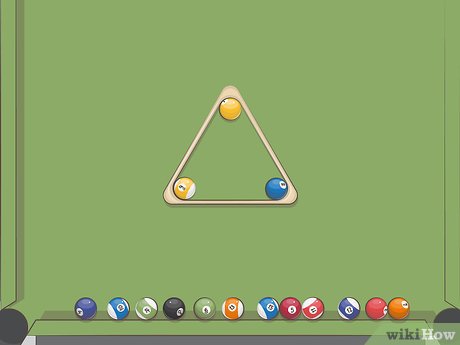 2Place a solid ball in one corner and a striped ball in the other corner. Pick any one of the remaining striped and solid balls to put them in the corners to provide an equal chance of one of them going in a pocket. It doesn’t matter which number the ball has on it, as long as it isn’t the 8-ball.
2Place a solid ball in one corner and a striped ball in the other corner. Pick any one of the remaining striped and solid balls to put them in the corners to provide an equal chance of one of them going in a pocket. It doesn’t matter which number the ball has on it, as long as it isn’t the 8-ball.- If one of the balls goes into a pocket on the break, the player can choose to keep shooting for that type of ball, or they can choose the other type. For instance, if the solid 6-ball went in the pocket, the player would be able to keep shooting solids or they can choose to shoot stripes instead.
- If both the striped and the solid balls go in a pocket on the break, the player who shot first gets to choose which type of ball they’d like to continue playing for.
-
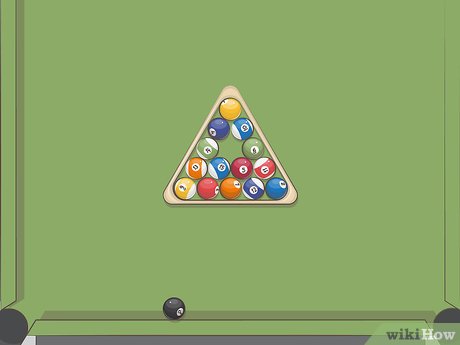 3Fill in the space between the corners with the rest of the balls. Place the balls in any order of solids and stripes, filling in any of the open spaces and making sure not to move any of the previously placed balls. Most players position a solid and a stripe in the lower 2 spots of the inner triangle.[3]
3Fill in the space between the corners with the rest of the balls. Place the balls in any order of solids and stripes, filling in any of the open spaces and making sure not to move any of the previously placed balls. Most players position a solid and a stripe in the lower 2 spots of the inner triangle.[3]
- Some players choose to alternate between solids and stripes as much as possible to make sure both solids and stripes have an equal chance of going in the pocket on a break.
-
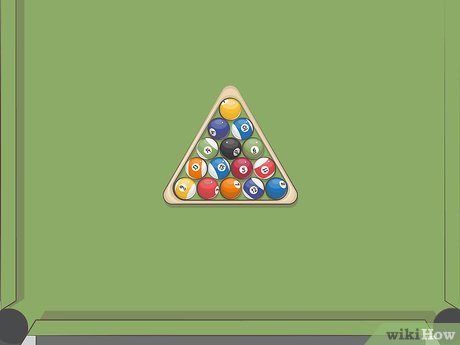 4Place the 8-ball in the center of the third row of the rack. This is done to reduce the likelihood of the 8-ball being pocketed on the break. Skip a row under the apex ball, and place the 8-ball so that it’s vertically aligned with the apex ball.[4]
4Place the 8-ball in the center of the third row of the rack. This is done to reduce the likelihood of the 8-ball being pocketed on the break. Skip a row under the apex ball, and place the 8-ball so that it’s vertically aligned with the apex ball.[4]
- If the 8-ball is pocketed on the break, the player who didn’t break would receive an automatic win for the game. Placing it in the center of the rack reduces the likelihood of this happening.
-
 5Roll the rack up and down to ensure that it is packed tightly. Push your fingers into the rack under the bottom row of balls, and then slightly push the rack forward. Pull the rack back again so that the apex ball is aligned with the foot spot and the base is parallel to the back of the table.
5Roll the rack up and down to ensure that it is packed tightly. Push your fingers into the rack under the bottom row of balls, and then slightly push the rack forward. Pull the rack back again so that the apex ball is aligned with the foot spot and the base is parallel to the back of the table.- If the table has flaws that prevent you from placing the apex ball directly over the foot spot, the UPA’s rules allow you to place it within a dime’s radius (half the width of a dime) of the foot spot.
-
 6Lift the rack up off of the table without moving the balls. Take your fingers out of the rack and place them on either side of the rack. Lift the rack directly up off the table to avoid touching or shifting the balls.
6Lift the rack up off of the table without moving the balls. Take your fingers out of the rack and place them on either side of the rack. Lift the rack directly up off the table to avoid touching or shifting the balls.- If you’re having trouble, try lifting the back end of the rack and pushing the apex forward and away from the balls before you lift it up. This will give you more space to move as you lift the rack.
Video
Tips
-
If you’ve never racked before, you can ask another player for assistance, or ask to have a practice rack before the game officially begins.⧼thumbs_response⧽
Submit a Tip
All tip submissions are carefully reviewed before being published
Thanks for submitting a tip for review!

Things You’ll Need
-
Regulation pool table
-
15 numbered balls
-
Triangular rack
[ad_2]
Source link : https://www.wikihow.com/Rack-in-8-Ball

